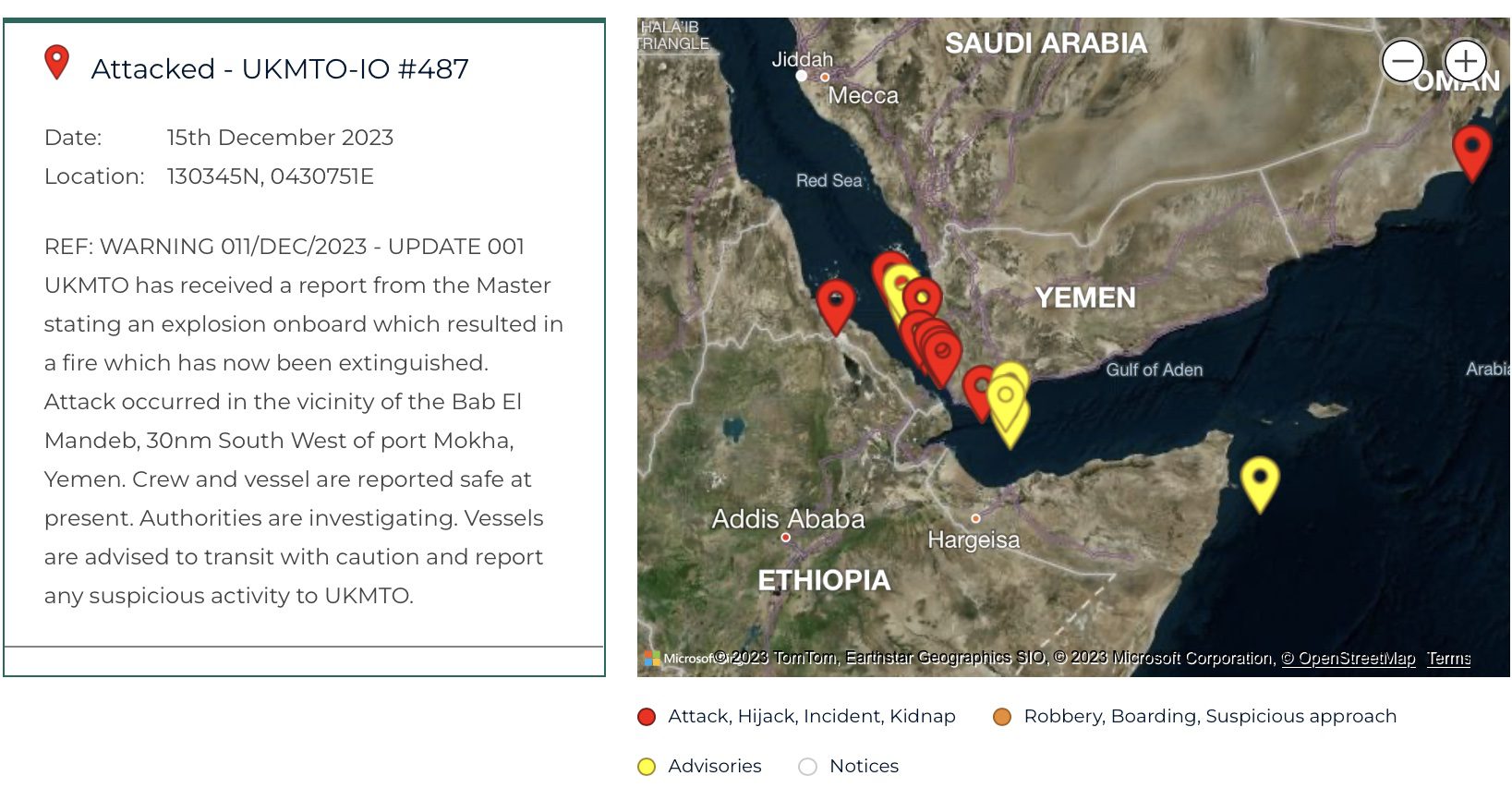Greek Ships Go Thousands Of Miles Further To Deliver Russian Oil
By Julian Lee Apr 4, 2025 (Bloomberg) –Three Greek oil tankers are going on detours of thousands of miles to deliver crude from Russia’s Baltic Sea to customers in Asia. The...

Update: Maersk has instructed all Maersk vessels bound to pass through the Bab al-Mandab Strait to pause their journey until further notice in response to the growing number of attacks in the region.
By Brendan Murray and Brian Wingfield (Bloomberg) —
Houthi rebels claimed a third Red Sea attack on container ships in the last two days.
A ship operated by Hapag-Lloyd AG, Germany’s largest container carrier, was attacked in the Red Sea on Friday — an apparent widening of the targets beyond vessels with significant business ties to Israel.
It’s the latest example of ships traveling through the Middle East facing greater risk of attacks on crews and cargo, threatening to squelch a recovery in global trade and boost transportation costs just as inflation is cooling across the world.
Incidents in the Red Sea could force ships to sail around Africa’s Cape of Good Hope, triggering surcharges for cargo owners. Maersk Tankers has indicated that its ships could avoid the Red Sea following the recent string of attacks.
Houthi militants based in Yemen and aligned with Iran have attacked ships closely linked to Israel as they traverse the region since Israel’s war in Gaza started.
The vessel Al Jasrah, with capacity to carry 15,000 20-foot containers, was sailing near the coast of Yemen and no injuries were reported, Hapag-Lloyd said in an emailed statement. The Hamburg-based company has offices in Israel and, according to its most recent quarterly report, two of its biggest shareholders are Qatar Holding Germany GmbH and Saudi Arabia’s Public Investment Fund.
“Hapag-Lloyd will take additional measures to secure the safety of our crews,” the statement said.
Reports were also circulating Friday of another incident involving a vessel in the vicinity operated by Geneva-based MSC Mediterranean Shipping Co., the world’s largest container line.
The Liberia-flagged Al Jasrah earlier this month stopped in Athens and sailed through the Red Sea on its way to Singapore, vessel-tracking data compiled by Bloomberg show. On Friday morning local time, it was approaching the Gulf of Aden.
The attack occurred near Mocha, Yemen, according to Ambrey Intelligence, which provides risk management services for ships. Ambrey also said in an alert that the MSC Palatium III and the MSC Alanya were targeted or warned to divert as they sailed through the area.
Houthi rebels announced on Saturday they would ban any ship regardless of its nationality from sailing to Israeli ports. However, the list of vulnerable ships appears to be widening well beyond those with very obvious Israeli ties.
“The Houthi militia has made clear that any vessel is a target,” said Peter Sand, chief analyst at Oslo-based Xeneta, which analyzes ocean and air freight markets.
The risk is rising that global trade through two of shipping’s most important canals will get diverted, making goods more expensive to transport and disrupting supply chains with unpredictable delays.
As vessels get attacked in the Red Sea before or after transiting the Suez Canal, a drought is choking traffic through the Panama Canal. That double-whammy is forcing cargo carriers to consider longer and costlier routes around Africa and South America to avoid trouble with the two best shortcuts between Asia and the US and Europe.
A.P. Moller-Maersk A/S on Thursday said one of its ships, the Maersk Gibraltar, was the target of an attack in the Red Sea, but no injuries or damage to the vessel was reported.
A spokesperson for the Houthi rebels armed forces said the Maersk Gibraltar was sailing to Israel and that it was struck after its crew refused their warning messages. He said they managed to ban a number of ships from sailing to Israeli ports during the past 48 hours.
After the incident, Maersk called for “political action to ensure a swift de-escalation.”
The US is working with allies to create a multinational effort to protect ships passing through the Red Sea in an effort to stem a surge in attacks by Houthi fighters that has provoked unease about commercial trade passing through one of the world’s most vital waterways.
“The Houthis represent a material threat to freedom of navigation, to commercial shipping, to lawful commerce, and they’re doing so in a vital artery,” White House National Security Adviser Jake Sullivan said at a press conference this week in Tel Aviv. “The United States is working with the international community, with partners from the region and from all over the world to deal with this threat. We are building a coalition.”
German Defense Ministry spokesman Arne Collatz confirmed that the US has asked the country’s navy to help provide security in the Red Sea, a request that’s under review by the government in Berlin.
© 2023 Bloomberg L.P.

Sign up for gCaptain’s newsletter and never miss an update

Subscribe to gCaptain Daily and stay informed with the latest global maritime and offshore news


Stay informed with the latest maritime and offshore news, delivered daily straight to your inbox
Essential news coupled with the finest maritime content sourced from across the globe.
Sign Up